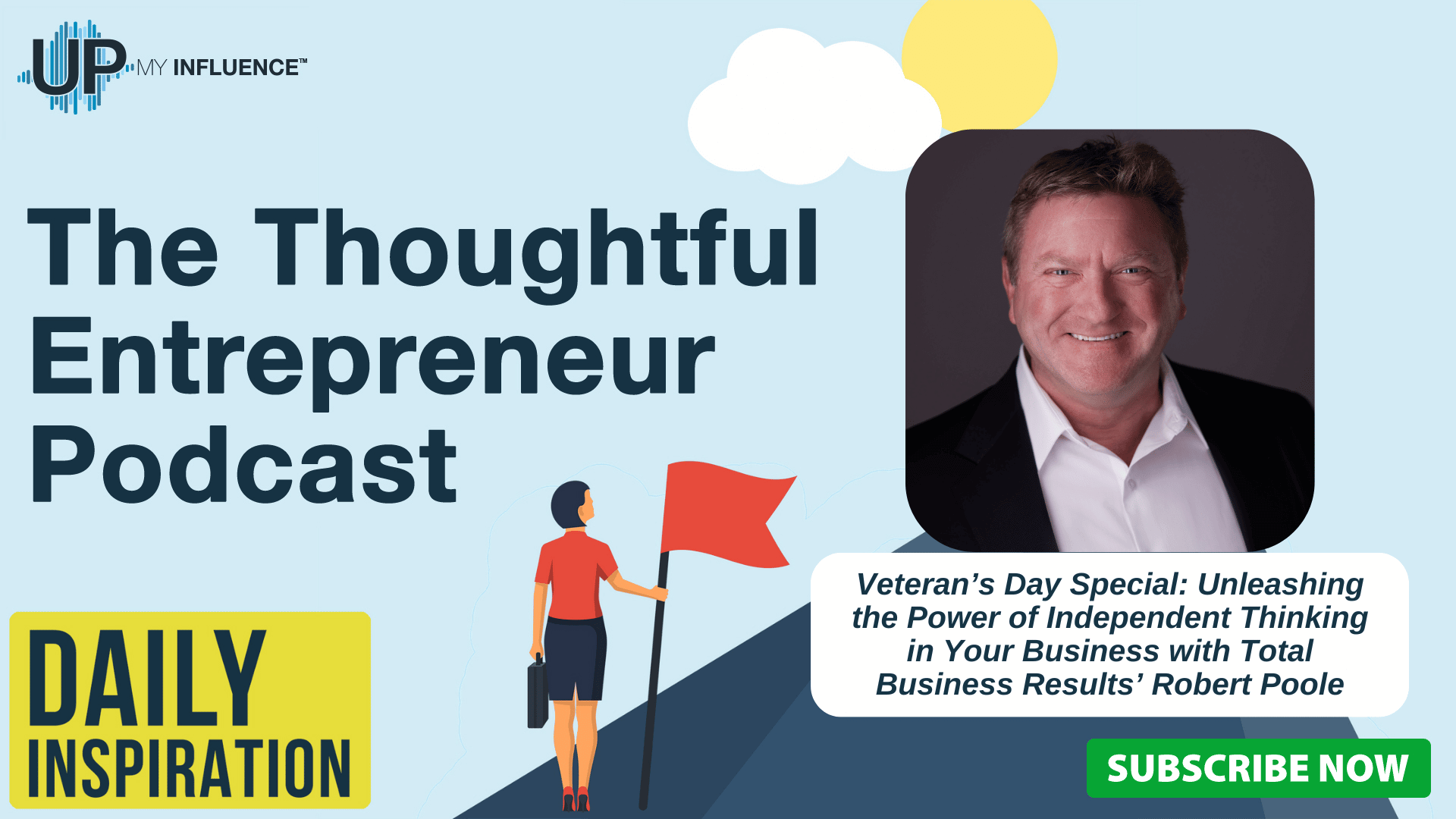THE THOUGHTFUL ENTREPRENEUR PODCAST
In this episode of the Thoughtful Entrepreneur, your host Josh Elledge speaks to the Co-Founder & Owner of Total Business Results, Robert Poole.

Robert's journey began 22 years ago, focusing on B2B cold calling. However, a life-altering event, his business partner's heart attack, led him to reevaluate his role and the future of his company.
This catalyzed Robert's mission to create a business that could thrive without his constant presence, a mission he now shares with other small business owners.
Robert shared his insights on addressing common issues such as overworking and the exhaustion that comes from constantly generating ideas. He emphasized the importance of building a strong team and fostering independent thinking within a small business.
Robert shared his experience implementing weekly meetings with his team, focusing on working on the business rather than just in it. He discussed the significance of trust in remote work environments, especially in today's context.
He discussed the importance of utilizing resources and seeking advice from knowledgeable individuals. He also acknowledged that finding solutions can be a customized process, depending on the specific circumstances and opportunities available. Robert highlighted the satisfaction that comes from overcoming challenges and solving big problems.
Key Points from the Episode:
- Robert Poole's background as the co-founder and CEO of Total Business Results
- The challenges faced by entrepreneurs, such as long hours and feeling overwhelmed
- The importance of finding a balance between work and personal life
- Total Business Results' focus on helping clients generate revenue, build the right team, create a strong company culture, and implement effective systems and processes
- The significance of personal growth and development for business success, as influenced by Tony Robbins' teachings
- The importance of learning from failures and seeing them as opportunities for growth
- Building a strong team and fostering independent thinking within a small business
- The significance of trust in remote work environments and creating a culture of ownership and maturity
- The need for customized marketing strategies and testing different techniques
- Utilizing resources and seeking advice from knowledgeable individuals to determine the best course of action
About Robert Poole:
Robert Poole is a seasoned entrepreneur and the co-founder/CEO of Total Business Results, a leading marketing firm specializing in aiding small B2B businesses in boosting sales and revenue. With over two decades of experience in entrepreneurship, business consulting, and marketing, Robert crafts tailored marketing strategies to help clients achieve consistent growth.
A graduate of the United States Military Academy at West Point with a degree in Economics, Poole served as a US Army officer before diversifying his career across sectors like commercial real estate, technology, and financial services.
His passion lies in assisting small business owners in reaching their goals and reducing stress. Robert hosts a podcast that imparts valuable insights and advice on B2B marketing and entrepreneurship, showcasing his dedication to empowering fellow business professionals.
About Total Business Results:
Total Business Results, established in 2002 by a group of industry veterans, is a prominent national B2B marketing firm that offers tailored solutions to businesses aiming to boost sales.
Functioning as a dedicated sales force, the firm handles essential tasks in the sales process, allowing clients to concentrate on closing deals with interested prospects.
With 18 years of expertise, Total Business Results excels in various B2B marketing techniques, including cold calling, telemarketing, lead generation, script writing, follow-up, email campaigns, and digital marketing.
Their approach combines innovative tools with traditional phone marketing to help small and medium-sized businesses penetrate their target markets effectively.
The firm's mission revolves around increasing profits while minimizing the cost per sale, emphasizing a high return on investment for every dollar spent. Total Business Results' philosophy is straightforward: deliver substantial sales growth to clients at the most cost-effective rates possible.
Tweetable Moments:
20:31 – “Imagine what it'll be like when you get on the other side of that [topic] and solve that big problem that you might be dealing with right now that's stressing you out.”
Apply to be a Guest on The Thoughtful Entrepreneur:
https://go.upmyinfluence.com/podcast-guest
Links Mentioned in this Episode:
Want to learn more? Check out Total Business Results at
https://www.totalbusinessresults.com/
Check out Total Business Results on LinkedIn at
https://www.linkedin.com/company/totalbusinessresults/
Check out Robert Poole on LinkedIn at
https://www.linkedin.com/in/macraemadeleine/
Check out Robert Poole on Twitter at
https://twitter.com/therobertpoole
Check out Robert Poole on Facebook at
https://www.facebook.com/TheRealRobertPoole
Check out Robert Poole on Instagram at
https://www.instagram.com/TheRobertPoole
Don’t forget to subscribe to The Thoughtful Entrepreneur and thank you for listening. Tune in next time!
More from UpMyInfluence:
We are actively booking guests for our The Thoughtful Entrepreneur. Schedule HERE.
Are you a 6-figure consultant? I’ve got high-level intros for you. Learn more here.
What is your #1 Lead Generation BLOCKER? Take my free quiz here.
Want to learn more about all the podcasts managed by UpMyInfluence? Opt in here.

